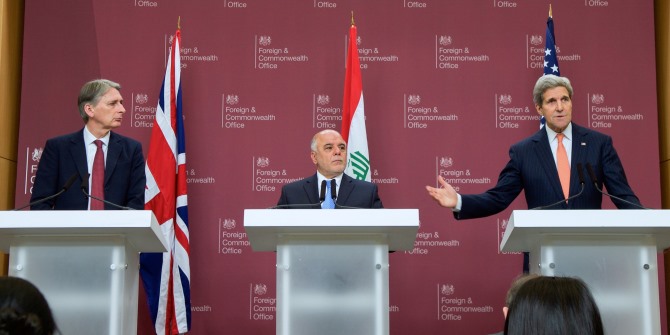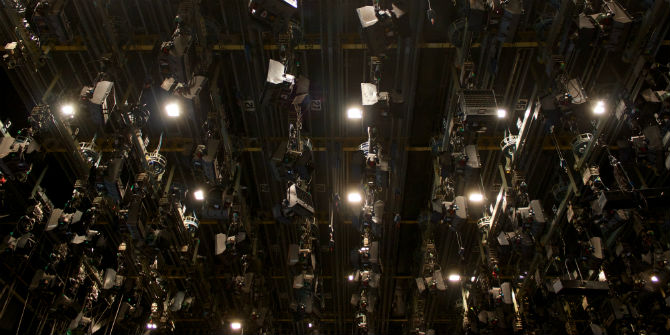 The international community is nowhere near using the full range of its military capabilities and the UK Commons Defence Committee was right yesterday to call on the UK government to do more in the fight against ISIS, writes Ranj Alaaldin. With momentum shifting against the group, ISIS must not be allowed to repair and rebuild.
The international community is nowhere near using the full range of its military capabilities and the UK Commons Defence Committee was right yesterday to call on the UK government to do more in the fight against ISIS, writes Ranj Alaaldin. With momentum shifting against the group, ISIS must not be allowed to repair and rebuild.
Twenty-one key countries leading the fight against the Islamic Sate of Iraq and Syria (ISIS) convened two weeks ago in London. Writing in The Telegraph, UK Foreign Secretary Philip Hammond stated at the time that they have convened to “use the full range of our diplomatic and military capabilities to bring together an international coalition to step up our response to international terrorism and the threat it poses to our collective security.”
But the international community is nowhere near using the full range of its military capabilities and the UK Commons Defence Committee was right yesterday to call on the UK government to do more in the fight against ISIS. Six months after the US conducted its airstrikes on ISIS targets, the international community is still yet to utilise its military capacity to full effect.
The momentum is certainly shifting against ISIS. It suffered defeat last week in Kobane at the hands of Syrian Kurdish forces and continues to suffer losses and casualties in Iraq as a result of the US-led air campaign and at the hands of the Iraqi armed forces, Shi’a paramilitary groups as well as the Kurdish Peshmerga. However, ISIS must not be allowed to repair and rebuild. It must not be given the breathing space that allows it to re-group and re-consolidate its grip. The jihadists have intimidated and eliminated rivals but those rivals are increasing, as is local discontent. This must be capitalised on.
ISIS’ decline is further evidenced by the survival of the Iraqi state. Against the odds and widespread anticipation last year in June, when ISIS took Mosul, Iraq’s second city, the Iraqi state has not disintegrated. This is bad news for ISIS. Iraq’s survival is tantamount to defeat for the jihadists. As a transnational organisation that functions on the basis of territory and resources from both Syria and Iraq, defeating the group in Iraq will undermine it in Syria and continue to shift the momentum against the group.
Iraq is crucial for ISIS because it prides itself on its control of territory stretching between Syria and Iraq. Upon taking Mosul last year in June, ISIS then declared a Caliphate; it projected an aura of invincibility that suggested it could bring down borders at will, allowing it to portray itself as a force for the future and swell its ranks with local and international recruits.
In other words, ISIS’ control of Iraqi territory became a symbol of its prowess and central to the organisation’s ability to sustain itself, expand and promote its brand of radical Islam. However, ISIS has been unable to expand its territory in Iraq since last year. In addition to suffering heavy losses, ISIS is also suffering because sectarian polarisation is decreasing in Iraq, thanks to Iraq’s new government and the leadership of its new premier, Haider al-Abadi, who has been lauded for not exacerbating sectarian tensions. This is worrying for ISIS as it has emerged from, and thrives on, sectarianism.

Recent Iraqi history proves that hitting ISIS harder and intensifying the military campaign more generally works. It worked in 2007 when a combination of US military personnel – injected into Iraq as part of what became known as “the surge” and the “Sunni Awakening” – paved the way for Sunni Arab tribal cooperation and the Sunnis’ integration into Iraq’s political process. Crucially, this came after the Sunni insurgency suffered heavy losses during its 2006 conflict with Iraq’s Shi’a community. It was forced into retreat after realising the new Iraq and its political process was here to stay, as was the ascendancy of Iraq’s previously oppressed and marginalised Shi’a community.
Just as the Sunni insurgency was (of which ISIS is a re-branded version), ISIS can also be contained, forced to disintegrate and then, eventually, eliminated. Its resilience requires a sustained military campaign, as opposed to a half-hearted military effort.
The military campaign is one part of the solution but an important one as it makes clear the new Iraq and its political order is here to stay. The other part requires, firstly, sustaining ongoing efforts toward reconciliation, the reconstitution of the Iraqi army and integrating Iraq’s Shia paramilitary groups into the armed forces. Prime Minister al-Abadi must stay true to his word and punish individuals and groups responsible for attacks, that includes Shia groups responsible for recent sectarian attacks and massacres on Sunnis.
Secondly, Iraq’s Sunni actors who have fought and continue to fight ISIS must be empowered. They exist but lack the resources and support to challenge ISIS. There is the concern that providing them with weapons and resources could work against the Iraqi government in the future. That, however, is a risk that might have to be taken as, ultimately, it is Iraqis and Iraqis alone that can, through a concerted effort, defeat ISIS and save the Iraqi state.
Note: This article gives the views of the author, and not the position of the British Politics and Policy blog, nor of the London School of Economics. Please read our comments policy before posting.
 Ranj Alaaldin is a Visiting Scholar at Columbia University and a Doctoral Candidate at the London School of Economics (LSE), where he works on Iraqi history and politics. He has published widely on Iraq and the Middle East and has travelled extensively throughout the region. More information about his research interests can be found at www.ranjalaaldin.com
Ranj Alaaldin is a Visiting Scholar at Columbia University and a Doctoral Candidate at the London School of Economics (LSE), where he works on Iraqi history and politics. He has published widely on Iraq and the Middle East and has travelled extensively throughout the region. More information about his research interests can be found at www.ranjalaaldin.com








Western governments MUST hit RADICALISATION Harder, if it is to reduce or prevent a particular nature of vulnerabilities, isolation and overall poverty – not least the psychological link to all of these chain of thoughts.
Though, the term ‘Radicalisation’ is mostly used throughout the media and political language to reference IS and their Chain of Thoughts, lets not be naïve to suggest that such a term ONLY belongs to this nature. Failure itself – due to POOR POLICY or NEGLECT of POLICY development by government – can also be an enhancement of failing those who already are failed.. or feel in psychological terms that they are failed.
Thus, in order to really WIN the HEART and MINDS, don’t we have to look deeper, be bolder and do more to enhance both social, economical and psychological well-being? And, shouldn’t that begin in schools?